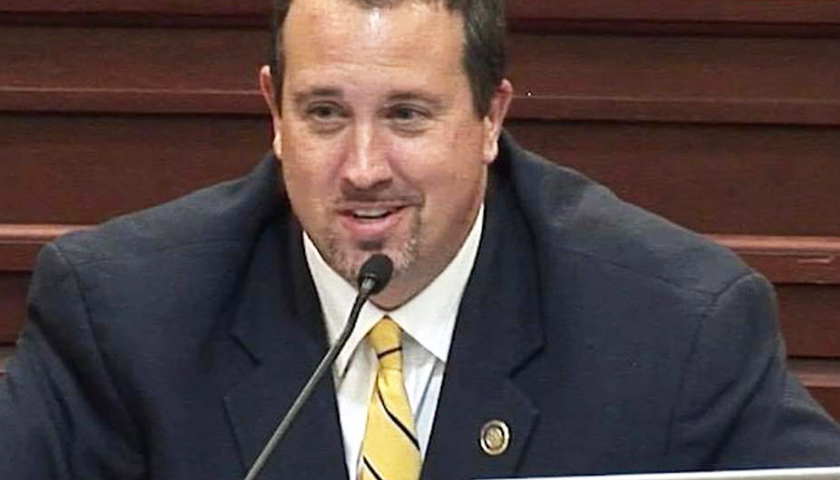Yesterday, a Pennsylvania House of Representatives panel passed a series of redistricting and election reforms, including a bill establishing a citizens’ commission for redrawing legislative districts.
The redistricting bill, sponsored by State Rep. Seth Grove (R-York), chair of the House State Government Committee which vetted the measure, would ditch the current process for creating legislative-district maps. Such maps are drawn anew every decade in response to population shifts revealed by the U.S. Census. Presently, a five-member Legislative Reapportionment Commission (LRC), made up of Republican and Democratic leaders from both state-legislative chambers and chaired by an appointee of the state Supreme Court, oversees district remapping.
Often, this system generates maps that maximize political benefit to one party over another, as Republicans maintain the new House map created by the current LRC does. A Democratic majority controls the Pennsylvania Supreme Court which appointed Democrat Mark A. Nordenberg as LRC chair – thereby giving Democrats sway over reapportionment.
Grove’s bill would amend the Pennsylvania Constitution to instead establish a Citizens’ Legislative Reapportionment Commission composed of 11 Pennsylvanians, eight of which would be chosen at large by the state legislature. The legislation would not permit legislature-appointed members nor their spouses to have held or sought an elected office, worked a state or federal job or worked either a partisan or lobbying job for at least five years prior to serving. The lawmaker said he made these stipulations to prevent the partisanship typical of the redistricting process hitherto.
Pennsylvania’s counties would vote on two additional appointees, with incumbent judges of the Commonwealth Court voting to select a final member among former Commonwealth Court judges. Once the commission selects citizen-submitted district maps respectively for the state House and Senate and adjusts those plans, the panel would need to muster two-thirds support to send the maps to the General Assembly for adoption.
The Keystone State’s constitutional process for redrawing state-legislative maps differs from the process by which congressional maps are drawn; the General Assembly is tasked with drawing the latter. Grove said the system he wants to implement for state districts is modeled on the path taken in recent weeks by the House State Government Committee to select a congressional map largely drawn by a private citizen, Amanda Holt of Lehigh County. A vote on that map by the full chamber is expected this week.
“Only the House State Government Committee selected a citizen’s map,” Grove said. “The LRC and government failed their jobs. This process ensures a citizens’ map.”
The chairman also had stern words for Gov. Tom Wolf, a Democrat, who has expressed reluctance to sign the congressional plan based on the Holt map.
“We have seen firsthand Gov. Wolf’s complete unwillingness to even engage in the congressional redistricting process with the General Assembly, ignoring his constitutional role in that process.”
Democrats said that Grove’s proposal would not dilute partisanship in redistricting because the citizens appointed to the new commission would all get appointed by politicians.
“We have the opportunity to make some great changes, not by having elected officials appoint people that they want to sit on this,” the committee’s minority chair, State Rep. Scott Conklin (D-State College), told colleagues. “But we have an opportunity to do exactly what we’re saying. Let’s look at doing a true citizens’ commission, one that the citizens are involved in, not the politicians.”
Conklin elaborated that the remapping process he envisions would expand field hearings and opportunities for public comment after a citizen-drawn map is selected for later revision.
Other legislation the State Government Committee approved yesterday included: a measure reassigning the wording of ballot questions to the Legislative Reference Bureau instead of the political Department of State; a bill increasing the number of ballots required to be printed for election precincts; a requirement that election machines be U.S.-made; a bill ending cross-filing for school-board candidates; and a policy allowing out-of-county poll watchers.
Among the six bills advanced to the full House, only the ballot-printing and made-in-America legislation received bipartisan support—unanimously in both cases. The reapportionment, ballot-question, school-board and poll-watcher measures all passed along party lines, with Republicans supportive and Democrats opposed.
How ballot questions get phrased for citizens’ consideration in the voting booth has been a matter of major contention ever since two state constitutional amendments appeared on the ballot in the 2021 primary to limit the governor’s emergency powers. Spurred by Wolf’s stringent COVID-19 countermeasures, Republicans offered the two amendments and won their enactment with majority support from voters. But the ballot questions were worded unattractively by executive-branch Democrats in what Republicans felt was an attempt to sink the constitutional changes.
Cross-filing for aspirant school directors has also been controversial. Presently, members of school-board candidates may compete for nomination not only in their own party’s primary but in the opposite party’s as well. If such a hopeful prevails in both primaries, he or she wins the general election by default.
Proposals to permit out-of-county poll watchers—citizens granted special access to observe polling places—used to have some Democratic support. But since mid-2016 Democrats have commonly rebuked the idea appointing residents of one county to watch polling precincts in another as a supposed GOP stratagem to “intimidate” voters.
– – –
Bradley Vasoli is managing editor of The Pennsylvania Daily Star. Follow Brad on Twitter at @BVasoli. Email tips to [email protected].
Photo “Seth Grove” by Representative Seth Grove.








